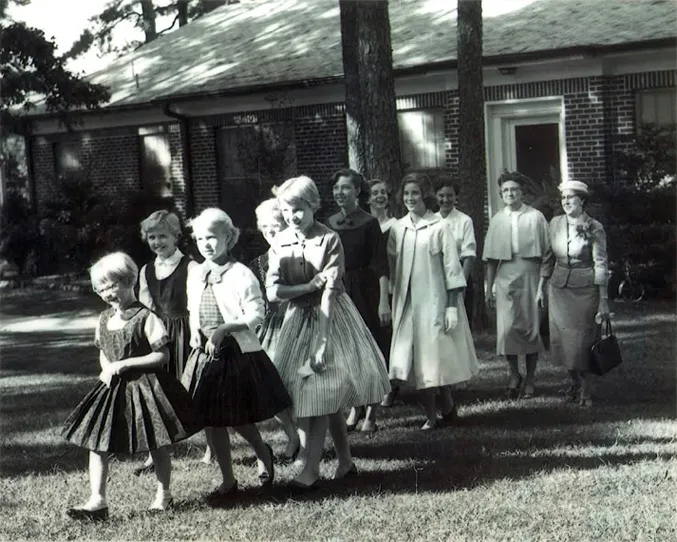We live in stressful times. For the first period in many decades a majority of Americans now report that they are more negative than positive about the future. We still deal with racism and systemic poverty.
Many of us believe that the best way to fight poverty and homelessness is not with church resolutions or even government programs but with stable families.
This argument is supported in a new book by Melissa S. Kearney in The Two-Parent Privilege: How Americans Stopped Getting Married and Started Falling Behind (University of Chicago Press). Dr. Kearney offers studies that, among other things, conclude that in economic terms, parents’ marital status has displaced race and class as a primary driver of child poverty and upward mobility. In other words, if one wants to identify factors that lead to what we today would call “privilege,” or “advantage,” consider primarily not race or class but whether a child grows up in a two-parent family with a father figure in the home.
Unfortunately, none of this is reflected in United Methodism’s newly revised Social Principles, which will be considered and voted on at this month’s 2024 General Conference.
According to some the new statement promises a new day for United Methodism, a day of enlightenment, inclusiveness, and justice. Dr. Lovett H. Weems, Jr., senior consultant with the Lewis Center for Church Leadership at Wesley Theological Seminary in Washington, gushes that the Social Principles, especially the statement on marriage, will be practical so that the post-disaffiliation United Methodist Church can begin to live together in new and constructive ways. Why? Because, according to Weems, the new statement will erase all references to the practice of homosexuality as incompatible with Christian teaching, a statement that has bred disunity and division in the church. Weems does not add that, in doing so, the statement must also delete any references to marriage as between a man and a woman, and any references to the moral code of “celibacy in singleness and fidelity in marriage.”
This is progress?
The proposed statement calls for nothing less than an about-face in a number of areas of church teaching. It would have us say “so long” to long-established Christian standards on marriage, the family and human sexuality, and “welcome” to extreme feminism, secular thinking, and the LBGTQ agenda. Biblical passages that have informed us in the past are now either excused, ignored, or re-interpreted. Such as:
- “Male and female created He them” (Gen. 1:27). In this transgender age, we choose our own gender regardless of how we were created.
- “Husbands, love your wives as Christ loved the Church” (Eph. 5:25). The new statement has problems discussing “husbands” and “wives,” so it deletes such references. This is to say, the new statement does not even use the words “husbands” or “wives.” This new thinking blurs differences between men and women, a feature of extreme feminism. In 1966 the National Organization for Women came up with a statement declaring that men and women are not different in meaningful ways, and any social pattern that presumes difference amounts to wrongful discrimination. Thus there should be no different sex roles in society and the family.
- “Therefore a man shall leave his father and mother and be joined to his wife, and the two shall become one flesh” (Eph. 5:31). If the words “husbands” and “wives” present problems in this new age, it is much more so for words like “fathers” and “mothers.” In the revised Social Principles there is not a single reference to “father” or “mother.” This shouldn’t be a surprise. In recent years, our church program calendar has downplayed observance of Mother’s Day or Father’s Day. The very word “Father” seems an anathema in the new Social Principles (as well as other progressive writing). God is nowhere referred to as “Father.” Nor are there any male pronouns used of God. There is mention of “Creator, Redeemer, Sustainer” but not “Father, Son, and Holy Spirit.”
- “As for me and my house we will serve the Lord” (Joshua 24:15). In the Bible the word “house” appears some 2,000 times, usually in regard to a building, but also in referring to a family or extended family (or “household”). In the Bible it is taught that the family is identified as the primary way the faith is communicated from one generation to another. However, this is not stated clearly in the revised Social Principles. In this new reconstruction of historic Christian teaching, there is nothing about family worship, or families identifying with a local church, or sisters and brothers in Christ. Indeed, the word “home” does not even appear.
There are references to “family.” The revised Social Principles tell us that “families” come in a variety of “sizes and forms.” But there is no assumption that “family” is a reference to fathers and mothers and children living together. In other words, family now means anything we want it to mean. By the same token gender can mean anything we want it to mean. Personal preferences, biases, and opinions now serve as ultimate authorities.
There is much in the Social Principles revision that is to be commended. Not so, however, in the positions on the home, marriage, the family, gender, and sexual purity. This should not be a surprise for those keeping track of the church groups that make up what is called “mainline” Protestantism. Actually, United Methodism, at least officially, has been a hold-out in the mainline Protestantism’s rush toward social progressivism. But this will change with the approval of the new Social Standards. United Methodists can now join other mainline denominations like the United Church of Christ, Episcopalians, PCUSA Presbyterians, Disciples, the United Church of Canada, and the Lutherans (ELCA) as having sold their souls to secular culture in which the Bible and traditional teaching no longer hold the moral standards by which society or the church should be based.
Too bad. There is in Methodism’s history a rich heritage of support for the family, the home, for marriage and for standards in sexual expression. Through the years it has not only been evangelicals and traditionalists, but also theological modernists and liberals who have upheld the importance of the family. As one of the best-known Methodist liberals of the 20th century, A. Dudley Ward, declared:
The implication of the early biblical record is that God established the family as the basic institution in human history. This has been endorsed as a primary factor of all human history. The New Testament built on and enhanced this cherished fact in the teachings of Jesus, in the doctrine of the epistles, and in the cosmic drama of the Revelation. (The Social Creed of the Methodist Church, Abingdon Press, 1961, p. 42).
What can we expect next? How far afield can all of this take us? Perhaps a recent article in Time magazine is suggestive. In the February 26, 2024 issue, an article, “Where do Americans Stand on Consensual Nonmonogamy?” states that 31 percent of singles in America have had consensually nonmonogamous relationships, such as polyamory (partners agreeing that each may have romantic relationships with other people), open relationships (committed primary relationships allowing for sexual activity with others), swinging (seeking other sexual partners together), and being monogamish (relationships that allow sexual variety with others, together or individually). The author argues that consensual nonmonogamy is not just nonmonogamy. The “consensual” element makes it a part of a huge societal blossoming of self-expression.
Religion is not even mentioned in the consensual nonmonogamy article. The author argues that monogamy is a carry-over from early farming cultures, when couples were dependent on each other to farm, making pair bonding necessary, especially for women, who were forced to be dependent on men, the property owners. Consensual nonmonogamy came into being with hunting-gathering societies because women, as gatherers, were as viable as male partners in contributing to the economy. This has advanced in our modern day and is becoming normalized, part of the larger societal movement toward self-expression. So much for the Bible and thousands of years of tradition. They aren’t even mentioned, even to be refuted. The revised Social Principles, thankfully, are not as extreme as the thoughts of this Time article, at least yet, but the thinking of modern secular culture seems to be trending in that direction.
All of this, that is the reversal of traditional thinking about the family, marriage, and human sexuality, reflects not the thinking of global United Methodism, but of secular progressive American culture.
Is this what the African churches want, to be dragged into American religious conflicts about marriage, the family and moral standards around issues of human sexuality? I think not. Nor, for that matter, is it what most American United Methodists want, even after the conclusion of disaffiliation. Again, we mention the gap, the wide difference between the thinking of the progressive elitists in the church, including seminaries, bureaucracies, and bishops, and ordinary church members.
May God help us.
Riley B. Case is a retired United Methodist clergy member of the Indiana Conference. His articles are published on Juicy Ecumenism, the blog of the Institute on Religion & Democracy.






Comment by Douglas Ehrhardt on April 22, 2024 at 4:00 pm
A post modern anti Christ institution.
Comment by Jah on April 22, 2024 at 11:16 pm
“having sold their souls to secular culture in which the Bible and traditional teaching no longer hold the moral standards by which society or the church should be based.”
Pathetic, but true unfortunately. I can only vomit them out of my mouth and have no fellowship with a false church spreading the ways of the world that is deliberately poisoning the body of the UMC instead of affirming The Holy Word of God, Christ Jesus, and His Ways as it should be. It’s a sad day to even have to read this nonsense smh come Lord Jesus quickly! The world is out of its mind!
Comment by Dean Stevens on April 23, 2024 at 1:28 am
Luke 17 Tells us …”as it was in the days of Sodom and Gomorrah so shall it be at the coming of the son of man.” Get ready, get ready, get ready, the end is coming soon.
Comment by John B on April 23, 2024 at 8:54 am
The UMC “Home” has been replaced with a apartment full of deviates. It is true that John 3:16 is for “whosoever believes ” but we don’t need the whomever as leaders to tell us that it’s OK. Bless the sinner, but not the sin.
I was told by a Christian friend, don’t just walk away from the UMC, run.
Comment by E on April 24, 2024 at 3:37 pm
I was sad to see the previous statement on marriages without children get stricken. The inconsistency is wild.
“We believe that God’s blessing rests upon such marriage, whether or not there are children of the union. ”
That line, and nothing like it, is in the new revised social principles. Seems important, particularly if you’re shifting views on marriage as well.
Comment by Mike Thompson on April 26, 2024 at 2:55 pm
This shouldn’t come as a surprise. Religion itself is no longer relevant in the 21st century. Science has sufficiently answered the questions religion once addressed. I fully expect that all of Christendom will disappear within the next few decades, at least in the developed world. Education has been a poison to religious belief. Good riddance.
Comment by Thomas on April 29, 2024 at 11:54 am
Heartbreaking it is, to fall from Grace as did Lucifer…
Comment by Dan on April 29, 2024 at 3:53 pm
I think St. Paul described this situation in his letter to the Galatians. “If anyone is preaching to you a gospel contrary to the one you received, let him be accursed.” That’s “anathema” for those of you interested in the theological term, and a pretty strong term it is.